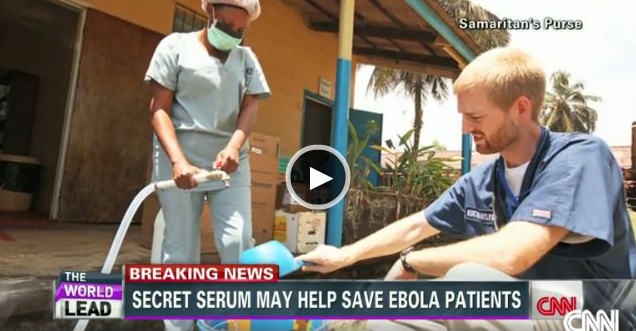You are here
cnn.com - by By Jacque Wilson and Danielle Dellorto - August 5, 2014
(CNN) -- Two American missionary workers infected with the deadly Ebola virus were given an experimental drug that seems to have saved their lives.
Dr. Kent Brantly was given the medication, ZMapp, shortly after telling his doctors he thought he would die, according to a source familiar with his case. Within an hour, doctors say his symptoms -- labored breathing and a widespread rash -- dramatically improved. Nancy Writebol, another missionary working with Samaritan's Purse, received two doses of the medication and has also shown significant improvement, sources say.
As there is no proven treatment and no vaccine for Ebola, this experimental drug is raising lots of questions.




Comments
How Does ZMapp Work?
cnn.com - by By Jacque Wilson and Danielle Dellorto - August 5, 2014
Antibodies are proteins used by the immune system to mark and destroy foreign, or harmful, cells. A monoclonal antibody is similar, except it's engineered in a lab so it will attach to specific parts of a dangerous cell, according to the Mayo Clinic, mimicking your immune system's natural response. Monoclonal antibodies are used to treat many different types of conditions.
Sources told CNN the medicine given to Brantly and Writebol abroad was a three-mouse monoclonal antibody, meaning that mice were exposed to fragments of the Ebola virus and then the antibodies generated within the mice's blood were harvested to create the medicine.
However, the drug can also be produced with proteins made from tobacco plants. ZMapp manufacturer Kentucky BioProcessing in Owensboro has been working with Samaritan's Purse and Emory University Hospital to provide limited quantities of the drug to Emory, according to company spokesman David Howard.
http://www.cnn.com/2014/08/04/health/ebola-drug-questions/
Ebola Virus: Giving Americans Drug Prompts Flak
Liberian Authorities Question Why Two Received Experimental Treatment; Second U.S. Patient Returns From Africa
wsj.com - by Cameron McWhirter, Peter Loftus and Drew Hinshaw - August 5, 2014
ATLANTA—As the second U.S. Ebola patient arrived in Atlanta on Tuesday, health authorities in Liberia raised questions about how the woman and an American doctor were given an experimental U.S. treatment unavailable to the hundreds of Africans sickened by the deadly virus.
While still in Liberia, both Nancy Writebol, who was working at an Ebola center for a Christian charity, and Kent Brantly, a physician there, received an experimental drug known as ZMapp. The drug's safety hasn't been tested in humans, and experts said it is too soon to know if it is effective.
For the drug to be used in Liberia, it would have to be approved by the country's Ministry of Health Ethical Committee, said Bernice Dahn, Liberia's chief medical officer.
(READ COMPLETE ARTICLE)